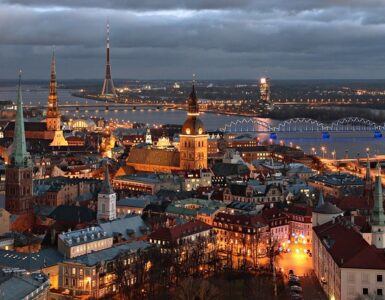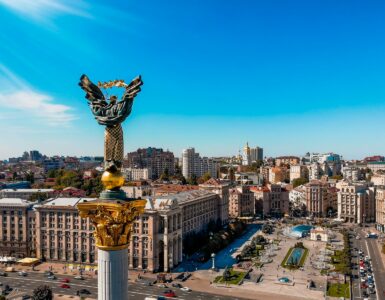BLOCKCHAIN
Russian food delivery service YobiDoyobi will launch its own cryptocurrency Yobi (#YBC). 200,000 coins to be issued on June 15 on the Blockchain Smart Chain platform can be used for placing orders for food and other options, the company said, adding that its strategic aim is the digitalization of the food business. [Source: RB]
Russian state-owned corporation Rostech introduced a blockchain platform CELLS designed to process payments in different currencies. The company says CELLS, which offers delivering fast and safe transactions, can substitute SWIFT. [Source: RB]
ECONOMY UNDER SANCTIONS
The European Union has imposed new sanctions on Russia and Belarus on Friday due to Russia’s invasion of Ukraine with support of Belarus. The new sanctions include a ban on Russian oil and cutting off some Russian major banks the from the SWIFT payments network. [Source: The European Council]
Arkady Volozh, the co-founder of Russian Internet giant Yandex, left all positions in the company after he was sanctioned by the European Union. Yandex’s shares saw a rapid decline following the decision Volozh called “misguided.” The company says Volozh’s step down will not affect Yandex’s operations. [Source: Reuters]
Taiwan has officially prohibited the exports of modern microchips and microcircuits to Russia and Belarus. A list of other equipment, including exposure equipment for wafer production and scanning electron microscopes, also falls under restrictions. [Source: DiGi Times]
RISE OF ANALOGUES
The Russian government may provide grants and subsidized loans for IT companies developing new software to replace foreign-made products, but it’s up to potential businesses to define which products they need. [Source: Forbes]
Russian big state-owned corporations have established an association of software consumers. The new entity with Rosatom, Rostelecom, Russian Railways, Transneft, and Roscosmos as founding members aims to facilitate the design of Russia-made software, first of all, high-effective IT systems. [Source: TASS]
The Russian government plans to replace international messaging apps like WhatsApp and Telegram with a domestic counterpart, planning to onboard all civil servants by the end of 2023. The Ministry of Digital Development said it also aims to move away from Microsoft Exchange mail server, Google Docs, Zoom and Skype services. [Source: Kommersant]
The Russian government will establish ‘industry competence centers’ to substitute foreign-made digital technologies that became inaccessible after major foreign manufacturers have left the Russian market. The centers to be created as a partnership of business and government to help accelerate development of domestic alternatives. [Source: TASS]
REGULATION
Roskomnadzor, a Russian state communications regulator, said it started to block popular virtual private network (VPN) services to restrict access to prohibited websites. Providers of VPNs said in a response they would be trying to bypass the block. [Source: The Moscow Times]
28 Russian Sony customers filed a lawsuit against Sony Interactive Entertainment Europe Limited and Sony’s Moscow office demanding to restore access to PlayStation Store. They’re seeking $4.5 million in damages. Neither Sony’s own rules, nor Russian legislation cover cessation of service due to state policy, which was the reason the company cited when it left the Russian market in March. [Source: Vedomosti]
OFFICE
About 20% of Russian companies faced a 20% hike in price for Russian-made cybersecurity solutions as well as delays in their supply amid the exodus of foreign cybersecurity providers, according to data compiled by Russian cybersecurity company Rostelekom Solar. The producers in turn cited shortage of computing capacities on clients’ side as a reason for delays in deployment of solutions and logistical problems with deliveries of imported components. [Source: Kommersant]
63% of vendors of office equipment and companies providing maintenance and repair services in this segment reported shortage of components, with 20% also noting an increase in their costs. Prices for repair and maintenance went up by 20-40% compared to the period before Russia’s invasion of Ukraine. [Source: Spark]
FIGHT FOR TALENT
65% of Moscow residents would like to work in the IT industry, with 92.5% finding the industry promising according to a recent survey. And 41% of those who expressed interest in having an IT job would like to be testers, followed by database administrator (23.4%), software engineer (14.1%), data scientist (7.7%), UX designer (5.5%), backend developer (4.6%) and front-end developer (3.8%). [Source: Spark]
Russian social network VK and The Digital Petersburg fund announced a competition for IT teams and coders. Participants will create applications in areas of ecology, transport and consumer services using data from the city’s communal services. [Source: VK]
SCIENCE
Russian and Chinese scientists have created a new composition of strontium and hydrogen that will speed up research into high-temperature superconductors.The scientists discovered that polyhydrate of strontium is a good ion conductor that can be used for superconductors. [Source: TASS]
Russian scientists proposed to use vitrimers in the production of composite materials. This approach will make it possible to recycle composites similar to plastic products. [Source: TASS]






Add comment